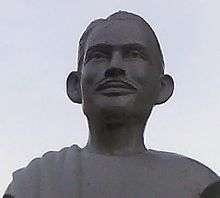Brajanath Sarma
| Brajanath Sarma | |
|---|---|
 | |
| Born |
September 15, 1894 Silagaon, Bajali, Barpeta, Assam |
| Died |
September 12, 1960 (aged 65) Guwahati, Assam |
| Language | Assamese |
| Nationality | Indian |
| Citizenship |
|
| Literary movement | Indian independence movement |
| Spouse | Gunawati Devi |
Brajanath Sarma (15 September 1894 – 1960)[1] (Assamese: ব্ৰজনাথ শৰ্মা) was a playwright, actor and a pioneer of Mobile Theater of Assam, India.
Biography
Brajanath Sarma, also called Natyacharjya (a guru of dramatics) was born in the village Shila in the Bajali Area of current Barpeta District of Assam. His father was Padmanath and mother, Nareswari. After clearing his entrance examination he enrolled for higher studies in the Tarinipriya Chatuspathy of Gouripur, Assam. But he left the studies and came back home. He joined the British Army and fought battles overseas in the First World War. During the period he met an Englishman named George and became interested in acting. While being posted in Basorah he was an active member of the West Bengal Dramatic Club and played roles in various Bengali Dramas from 1917 to 1921.
In 1921, he returned home and forms a drama group in his village bearing the name - Xilpa Kalika Opera Party. The drama group was dismantled in 1924 and he formed a new group called Ganakbari Opera Party. Five years later, in 1930, he formed his historic Kohinoor Opera party.
He was the pioneer of co-acting in the Assamese Theater. His was also the first party to tour and perform dramas in various places like Bengali Jatra in Assam. The same movement later translated into the now famous Mobile Theaters of Assam.
In 1936, he discontinued Kohinoor Opera Party and joined the Indian independence movement. He was the Vice-President of Barnagar Congress Committee. During the period of Quit India Movement, he and his associates alienated themselves from the non-violence movement and was the architect of destruction of the Barnagar Aerodrome and Xarbhog police station. For the same, he was jailed for three years in 1943. After that jailed period he went into business.

Following the independence of India, he joined Socialist Party and severed his ties with Congress. He contested election from the Socialist party in 1952 and lost.
In the later years of his life, he came back to dramas.
He died of respiratory disease in Guwahati in 1960.
his works
plays
- Barjita
- Manomati
- Patita
- Karuna
- Urbashi
autobiographical
- Biplobi
References
- Barman, Sivnath (1992). Axomiya Jeebanee Avidhan; (Assamese Biographical Dictionary). Guwahati: Sophia Press and Publishers Pvt. Ltd.